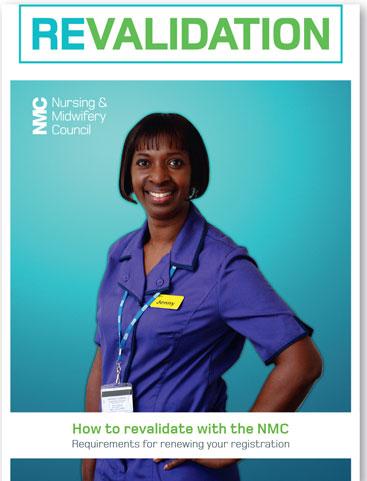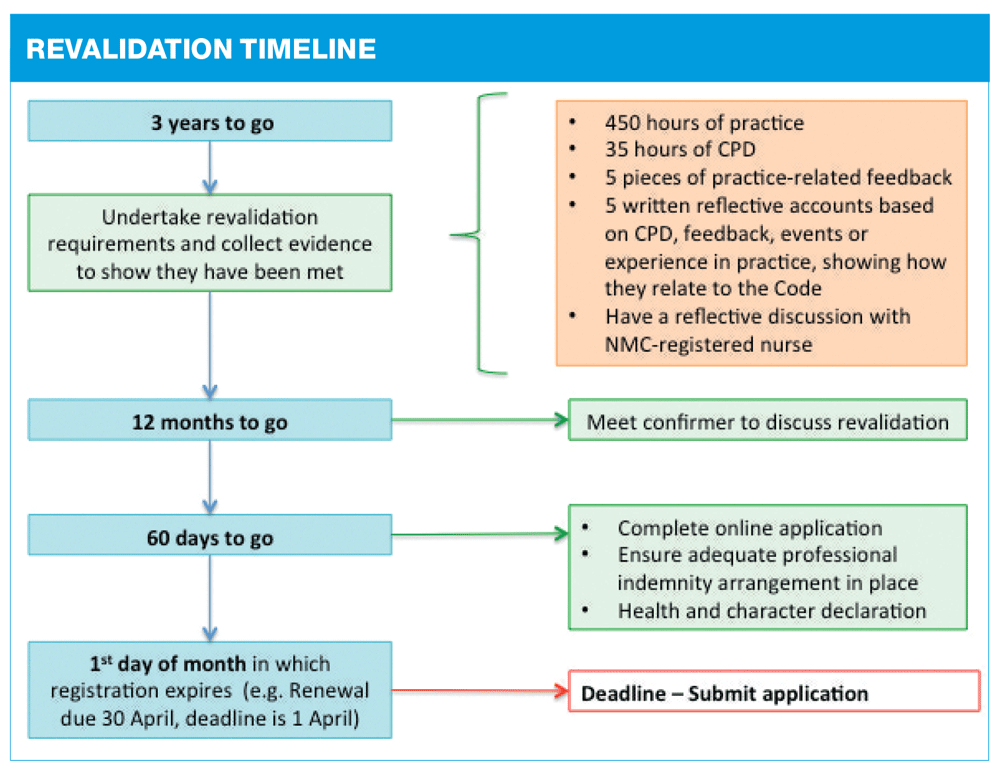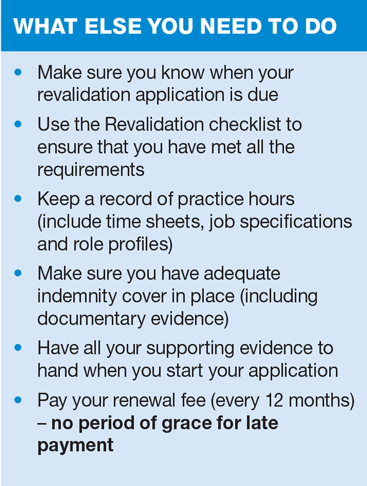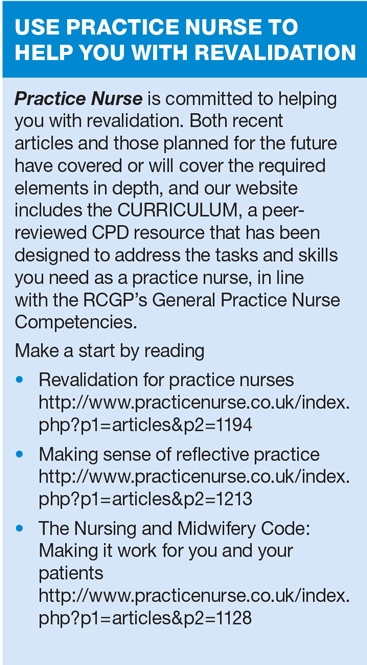Making sense of revalidation
Mandy Galloway, Editor, Practice Nurse
Mandy Galloway, Editor, Practice Nurse
At a recent meeting, NMC chief executive Jackie Smith said she didn’t want to ‘frighten the horses’ but for those nurses whose registration renewal falls due in April, it was probably too late to start preparing for revalidation. However, although time is tight for the first cohort of revalidation candidates, many of the requirements are things you are probably already doing – so it is a matter of collecting the evidence that you have done or are doing them, arranging to have your reflective discussion and confirmation, and submitting your application. Here is our summary of some of the things that practice nurses might find – at first sight – most daunting
Appraisal
Make sure you have an appraisal
The revalidation process is designed so that it can form part of an appraisal process, and the NMC recommends that you use your annual appraisal to have your revalidation discussion and obtain confirmation.
The NMC defines appraisal as a way for the employer to assess the performance of the employee against the requirements of their role and to identity areas for improvement and development.
In an ideal world, appraisal provides an opportunity to discuss what has been achieved since the last appraisal, what are the goals before the next and what needs to be done to enable them to be met. This forms the basis of a personal /professional development plan, which should include identification of training and CPD needs and SMART (Specific, Measurable, Attainable, Realistic, Timely) objectives. See ‘Why every practice nurse should have an appraisal’ for further details.
For practice nurses, appraisal may be conducted by the practice manager and a GP together – although in many practices appraisals do not take place.
If the appraisal is used for the revalidation discussion and confirmation, it is important that whoever conducts it should be aware of the NMC Code and standards expected of registered nurses in their professional practice. If they are not, refer them to the NMC document, Information for confirmers.
Confirmation
What do you do if you do not have a line manager?
Not all practice nurses will have a line manager, and will therefore have to decide on someone else to act as confirmer. The NMC recommends that wherever possible this should be a registered nurse, ideally someone who works in a similar scope of practice even if they do not have any managerial responsibilities for the individual.
If the confirmer is another registered nurse, they
- Must have an effective registration
- Cannot be retired, no longer registered, or suspended, removed or struck off the NMC register
If you do not have either a line manager or another NMC-registered nurse to provide your confirmation, you can get confirmation from another healthcare professional that you work with – a GP, for example. They must be able to provide details of their profession and their own registration (GMC) number.
If you have to get confirmation from someone who is not a nurse on the NMC register, you will need to have had your reflective discussion with a registered nurse before seeking confirmation.
The confirmer has to be in a position to confirm that you have met all the revalidation requirements – this will be easy if your confirmer is also your manager. The minimum requirement is a discussion between you and the confirmer about your practice, and the confirmer will need to see evidence that demonstrates that you have met the requirements for revalidation.
The role of the confirmer is not to make a judgement on the overall quality of the nurse’s practice – only that they have met the mandatory requirements. They are not being asked to decide whether you should be revalidated or should remain on the register – that is the NMC’s job.
Revalidation is not a new way of raising fitness to practise (FtP) concerns – but if these arise during the course of the confirmation process, concerns should be raised promptly through the NMC’s usual FtP procedures. This also applies if you are acting as a confirmer – if you have a concern about another nurse’s fitness to practise your shouldn’t wait until their revalidation is due to raise the issue.
You should not ask someone you know to act as confirmer if there is likely to be a conflict of interest which could undermine their impartiality or objectivity. So you can’t just agree with your best friend at work to act as each other’s confirmers. The NMC says: ‘It would not be appropriate for a family member or person with whom you have a close personal relationship to be your confirmer. Both you and your confirmer will need to decide whether there is any conflict of interest or perception of bias to ensure that the confirmation process retains credibility and remains objective. In some cases you might decide to use a different person as your confirmer. The responsibility for this lies as much with you, as a professional nurse, as with your confirmer.’
You should obtain confirmation that you meet the requirements for revalidation in the final 12 months before your revalidation date – this is to ensure that it is recent and current. If confirmation is dated earlier than this, the NMC may want to know why. But don’t leave it too late: the NMC reminds us that you have 60 days before your revalidation date to submit your application, and strongly recommends that the confirmation discussion takes place well in advance to allow time to complete all the requirements and obtain confirmation.
CPD
Keeping up to date
As a professional, you have a duty to keep your knowledge and skills up to date, by a process of continuous learning and reflection. The requirement for 35 hours of CPD, which must be related to your scope of practice, aims to help you maintain safe and effective practice, to improve your practice or to develop new skills. Of the 35 hours, 20 must include participatory learning – such as face to face education sessions, conferences or educational meetings – to avoid professional isolation. (And it is good to get out and network with colleagues!)
Written reflective accounts should demonstrate what you have learned from the CPD activity, feedback, event or experience in your practice, how you have changed or improved your work as a result, and how it is relevant to the Code.
Examples of acceptable CPD activity include structured learning (direct or distance learning), accredited higher education or training, mandatory training relating to your practice (e.g. safeguarding, CPR and anaphylaxis, infection control; cervical screening if this forms part of your role), reading and reviewing publications, research, peer review, coaching and mentoring.
Evidence
Keep a portfolio
The NMC strongly recommends that you keep a portfolio of evidence that you have met the requirements for revalidation. You will need a portfolio to inform your discussions with your confirmer, and in case the NMC wants to review it to verify the declarations that you make as part of your application for revalidation. Your portfolio can be online or a physical folder – indeed, some of the requirements have to be met by completing mandatory forms so some kind of physical storage may be helpful.
As well as recording your hours of practice, your reflective accounts and discussions, your portfolio should include a record of the CPD activities you have undertaken. It is no use claiming that you spent an hour reading Practice Nurse – you need to record what the article was about and how if impacted on your practice and relates to the Code.
The information you need to record is:
- The CPD method
- A description of the topic and how it related to your practice
- The dates the activity was undertaken
- The number of hours
- Identification of the part of the Code most relevant to the activity
- Evidence that you undertook the activity
The NMC recommends that you keep your portfolio until after your next revalidation – i.e. for a minimum period of three years.
MANDATORY FORMS
Your reflective discussion with another NMC-registered nurse, your reflective accounts and a record of your discussion with your confirmer must be recorded on the mandatory forms available on the NMC website. They should be completed, stored and shared in manual paper form, rather than electronically, to avoid having to register with the Information Commission. The forms provided cannot be edited so you need to download them and print them off, and then complete in your own handwriting.
The forms are available at http://www.nmc.org.uk/standards/revalidation/revalidation-guidance-and-resources/
MAINTAINING CONFIDENTIALITY
It is essential that you do not record any information that might identify an individual – even after their death. This includes patients or service users, colleagues or others.
So, for example, your reflective accounts and notes must NOT include
- The name of any individual
- The date of any incident or event
- The place where the event occurred
- Descriptions of any unique circumstances that would allow the individual to be identified
Feedback
Gathering practice-related feedback
One of the mandatory requirements for revalidation is to collect five pieces of practice-related feedback over the three years since you last renewed your registration.
The aim is to ‘encourage nurses to be more responsive to the needs of patients’ by seeking feedback from colleagues and patients and using it to improve their practice.
The NMC suggests using a variety of sources:
- Patients
- Nursing and medical colleagues
- Managers, receptionists, healthcare assistants
Other sources include:
- Complaints
- Team performance reports
- Serious event reviews, and
- Annual appraisal.
Feedback might be about your individual practice or organisation – but you need to be clear about its impact on your own practice. It can be formal or informal, written or verbal, and positive comments or constructive criticism.
At first sight this requirement may seem daunting, but the NMC points out that it is likely that you will already have collected feedback in a number of ways. But the NMC warns that you need the consent of your employer before using their information – so you can’t just forward work emails to your personal email account or copy work documents or records with the consent of the practice.
If you ask for feedback from patients or colleagues, you must make sure that it doesn’t include any personal identifying information, and that they know what the feedback is to be used for.
The NMC does not require you to survey patients or carry out 360° feedback for the purposes of revalidation.
Keep a note of any feedback you receive, and how you have used it to improve your practice. (See Making sense of reflective practice, Practice Nurse October 2015).
Related articles
View all Articles



